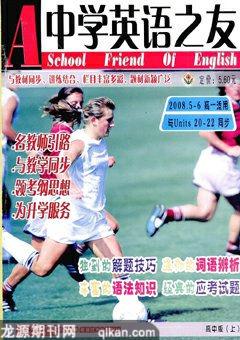V-ing形式作状语用法“四注意”
李国勤
V-ing形式作状语,可以表示时间、原因、结果、条件、让步、行为方式、伴随状况等。如:
Being a teacher, you should help your students in every way.(原因)
He died from a sudden traffic accident, leaving the experiment half-done (so that he left the experiment half-done).(结果)
Seeing my parents waving in the crowd, I went running to them.
(时间;方式)
The students entered the classroom, following their English teacher.
(伴随)
Listening to English every day (If you listen to English every day), youll learn it well step by step. (条件)
学习V-ing形式作状语的用法时,需要注意以下四点:
(一)与过去分词作状语的区别。一般来说,V-ing形式表示主动、进行;过去分词表示被动、完成。试比较:
The enemy fled in a panic, leaving behind a lot of dead bodies and weapons.
Defeated and frightened, the enemy fled in a panic.
分析:前一例中的V-ing形式在句子中作伴随状语,它与其逻辑主语the enemy之间为主动关系;后一句中的过去分词defeated和frightened表原因,
它与其逻辑主语the enemy之间为被动关系。
(二)关于逻辑主语的问题。V-ing形式作状语时,一般情况下,其逻辑主语应与主句的主语保持一致。如:
Comparing all the great people with each other, youll find that they have much in common.
Finding her car stolen, she hurried to a policeman for help.
(上海2001,28)
Having suffered such heavy pollution already, it may now be too late to clean up the river.(NMET 2001, 35)
分析:前两例中,V-ing形式的逻辑主语均为主句的主语。最后一例中,having suffered的逻辑主语是the river,并不是主句的主语it。这种用法极为少见,有的语法家称其为垂悬分词,我们在学习中不宜模仿。
(三)V-ing形式的否定式。其基本结构是:not+V-ing形式,无论在完成式还是被动式里,not必须置于V-ing形式之前。如:
Not having finished his homework, the boy was still doing it in the classroom.
(四)V-ing形式(短语)的功能有时相当于一个状语从句。根据这个性质,我们在使用V-ing形式作状语时,切记不要在前面或后面的句子前用连词连接。如:
Walking on the fallen leaves in autumn, so youll feel very comfortable.(×)
分析:如前所述,V-ing形式短语相当于一个状语从句,所以后半句中的连词so的使用是错误的,应该去掉。原句应改为:
Walking on the fallen leaves in autumn, youll feel very comfortable.
巩固性练习:
请用括号里所给动词的适当形式填空:
1. ____(Live) in a southern city of China, I have never seen such a
wonderful snow view.
2. ____(Not grow) up yet, youre not allowed to enter the bars.
3. ____(Encourage) by the director, the actors performed wonderfully in
the play.
4. ____(Know) all this, they made me pay for the damage.
5. The students are sitting in the reading-room, ____(read) all kinds of
books.
Key:1.Living 2.Not having grown 3.Encouraged 4.Knowing 5.reading

